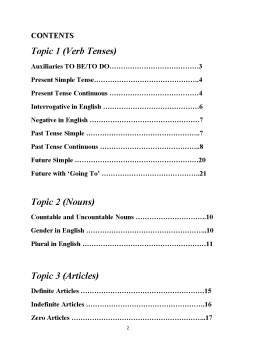Cuprins
- CONTENTS
- Topic 1 (Verb Tenses)
- Auxiliaries TO BE/TO DO 3
- Present Simple Tense 4
- Present Tense Continuous 4
- Interrogative in English 6
- Negative in English 7
- Past Tense Simple 7
- Past Tense Continuous 8
- Future Simple 20
- Future with ‘Going To’ 21
- Topic 2 (Nouns)
- Countable and Uncountable Nouns 10
- Gender in English 10
- Plural in English 11
- Topic 3 (Articles)
- Definite Articles 15
- Indefinite Articles 16
- Zero Articles 17
Extras din curs
1. AUXILIARIES IN ENGLISH
TO BE TO HAVE
I am=eu sunt I have-eu am
You are=tu esti/voi sunteti You have=tu ai/voi aveti
He/She/It is=el/ea este He/She/It has=el/ea are
We are=noi suntem We have=noi avem
They are=ei/ele sunt They have=ei/ele au
GREETINGS
Hello!
Hi!
Good morning!
Good afternoon!
Good evening!
Good night!
Good bye!
Bye! Bye!
See you later!/See you soon!
2. PRESENT SIMPLE
We use this tense for :
-facts and permanent states: Ralph works for a plumbing company.
-general truths and laws of nature: The moon revolves around the Earth.
-habits and routines(with always, usually..): We usually rent films at the weekends.
-timetables and programmes (in the future): My plane lands at 6.00 exactly.
-sporting commentaries, reviews and narrations: Lee swings his bat and scores a home run.
-likes and dislikes I love Slovenia. It’s a beautiful country.
It is formed with “S”/”ES” added at 3rd person singular
Ex: to work-he works
to wash-he washes
TIME EXPRESSIONS used with present simple:
-usually, often, always, every day/every week, in the morning, at night, on Fridays
3. PRESENT CONTINUOUS
-TO BE + VB +ING
-for actions taking place at or around the moment of speaking:
He is washing his car now.
-for temporary situations
We are replacing the carpets in the bedroom this weekend.
-for fixed arrangements in the near future
We’re signing up for a yoga class tomorrow.
-for currently changing and developing situations
The days are becoming shorter and shorter.
-with adverbs such as ALWAYS to express anger or irritation at a repeated action
You are always blaming others for your mistakes.
TIME EXPRESSION used with present continuous:
-now, at the moment, at present, these days, nowadays, still, today, tonight
INTRODUCING SOMEONE (FAMILY AND FRIENDS)
-Hi! This is my friend, Mike!
-Hello, Mike! Nice to meet you!/ Glad to meet you!/How do you do, Mike!
-It’s a pleasure meeting you!
-Hello! May I introduce Mary, Mike’s sister?
Vocabulary practice containing words describing family members and relatives
EXERCISES:
Put the verb in the correct form, present continuous or present simple:
1. Let’s go out. It (not/rain) now.
2. Julia is very good at languages. She (speak) four languages very well.
3. Hurry up! Everybody (wait) for you.
4. ‘ (you/listen) to the radio?’ ‘No, you can turn it off.’
5. ‘ (you/ listen) to the radio every day?’ No, just occasionally.
6. The River Nile (flow) into the Mediterranean.
7. Look at the river. It (flow) very fast today-much faster than usual.
8. We usually (grow) vegetables in our garden but this year we (not/grow) any.
9. ‘How is your English?’ ‘Not bad. It (improve) slowly.’
10. Ron is in London at the moment. He (stay) at the Park Hotel. He (always/stay) there when he’s in London.
11. Can we stop walking soon? I (start) to feel tired.
12. ‘Can you drive?’ ‘I (learn). My father (teach) me’.
13. Normally I (finish) work at 5.00, but this week I (work) until 6.00 to earn a bit more money.
14. My parents (live) in Bristol. They were born there and have never lived anywhere else. Where (your parents/live)?
15. Sonia (look) for a place to live. She (stay) with her sister until she finds somewhere.
16. ‘What (your father/do)?’ ‘He’s an architect but he (not/work) at the moment.’
17. (at a party) Usually I (enjoy) parties but I (not/enjoy) this one very much.
18. The train is never late. It (always/leave) on time.
19. Jim is very untidy. He (always/leave) his things all over the place.
Preview document
Conținut arhivă zip
- LImba Engleza.doc



































